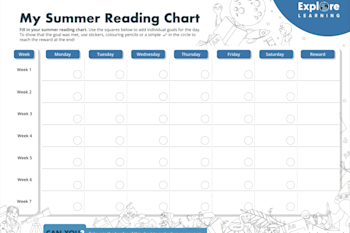Summer reading lists and tips for kids

Don’t let reading slide this summer! Find some summer reading ideas for parents and children in our summer reading list guide…
For children, summer is all about fun and enjoying the time off from school, but that doesn’t mean their reading should suffer or they should miss out on summer learning.
We have plenty of summer resources available for you to help children continue learning, but one of the best ways for children to keep practicing their literacy is regular reading. Reading can be fun and there’s a lot of ways you can encourage your children to read more over summer, that’s why we’ve come up with these summer reading ideas for parents to help their kids.
Fun summer reading activities
The best way to encourage your children to keep practicing their reading skills over summer is to make reading fun!
Not every child will have a natural love of reading, but getting your reluctant readers to do some reading doesn’t have to be a struggle. From coming up with a reading list together to changing the reading material completely, there are plenty of ways to make reading more engaging for your child.
Let’s take a look at some fun summer reading activities to get your child reading…
How can I make summer reading fun for kids? Our top tips!
Here are some of our top tips to make summer reading fun for children:
Pick the right books– the first step to making reading fun is to pick the right books, ask your child what sort of stories they like. Do they like adventure? Fantasy? Horror? Make a summer reading list of books your child likes the sound of together.
Read aloud together– add a bit of excitement to any book by reading aloud together. Show your child that you’re interested in the stories they’re interested in, and make things fun by using different voices for different characters.
Act out scenes from stories– make things even more exciting by acting out scenes from the stories your child is reading. Encourage them to use their imagination, come up with alternate scenes and endings together.
Encourage reading in all forms– your child won’t always want to sit down and read a book, but that’s not the only form of reading. Comics, graphic novels, magazines and even newspapers if they’re interested are all valid ways to practice their reading skills.
Choose books related to their interests– every child has interests; sports, dinosaurs, animals, the list goes on! And for every interest, there’s a children’s story. Choose books that align with their interests.
Create a reading corner– try to create a space all their own, somewhere quiet and cosy where your child can sit quietly with a book they’re enjoying. Pillow forts will always go down well with children, and always make for a cosy reading space!
Make connections between stories and real life– encourage your child to choose books that relate to what’s going on in their life. Going on a camping trip? Try books about adventure. Heading to the museum? Books about dinosaurs!
Let them choose the books– ultimately you want to ensure your child actually enjoys the books they’re reading, and the best way to do that is to let them choose. That way they’ll feel some control and be more excited to sit down with the book they chose.
Listen to audiobooks– if your child wants a break from reading or struggles to read often, try audio books. They’ll still keep your child engaged and improve their comprehension skills.
Start a series– solve the problem of wondering what book to read next by starting a series of books, there are plenty of children’s book series out there! It’s a great way to keep children engaged as they wonder what’ll happen next.
Set a reading goal– set a daily reading goal with your child, something that’s doable for them. It can just be a few pages, or a whole chapter. Don’t worry if they struggle to hit the goal some days, remember that they’re supposed to be having fun.
Visit the library– libraries can make for a great day trip, and they’re full of books to choose from without having to worry about paying. Take your child for a trip and get them to choose a book or two they like the look of.
Teach reading strategies– if your child is avoiding reading completely it might be because they’re lacking reading skills, so work together to build some reading motivation for them. Perhaps talk to their teacher before the summer break to see if they can help you.
Stick to these summer reading tips and your children will be reading for pleasure in no time!
What can parents do at home to support reading?
In addition to our top tips to get your children reading over summer, there are a few simple ways you can support your child’s reading at home.
Schedule reading into your daily summer holidays routine for your children.
Read with your child, whether you’re reading out loud or each reading your own books together.
Try to fill your home with fun children’s books, or if you can’t try to work regular library trips into your summer holiday schedule.
Encourage your child to read independently by setting summer reading goals with rewards.
Go and do some outdoor reading with a word hunt. Reading doesn’t always have to be indoors with a book, see if you can find an object for every letter of the alphabet, and see if your child knows what every word means.
What are some summer reading goals?
By setting goals for children’s reading over summer you can give them something to work towards and make reading much more engaging. So we’ve made this summer reading goal chart that you can use with your children:

The summer reading goal chart is really easy to use and gives children something to work towards, and you can decide the rewards for keeping on top of summer reading. Talk to your child so you can set them a daily reading goal. For every day they hit their reading goal you can give them a point on the reading chart, and if they get enough points each week you can give them a reward.
Summer reading list
Need some inspiration for a children’s reading list this summer? We’ve put together a list of some great reads to give you some ideas!
Ages 3-5
Ages 5-7
You Can’t Take An Elephant On Holiday by Patricia Cleveland-Peck
The Marvellous Granny Jinks and Me: Animal Magic! by Serena Holly
Ages 7-9
Ages 9 – 11
Age 13+
Learning This Summer
Summer should be about fun, but you can still set a little time for your child to learn. There are plenty of things to learn in summer and it’s okay to spend the occasional day getting ready for the next school year.
We have plenty of free learning resources that you can use to help your child continue expanding their mind this summer. We can also help your child prepare for back to school with online tutoring to fit around your schedule.
Why not try a free trial and see if Explore Learning could help your child prepare for the next school year.
Cancel anytime
No joining fee
In centre or online
Memberships to suit you
Cancel anytime
No joining fee
In centre or online
Memberships to suit you
Cancel anytime
No joining fee
In centre or online
Memberships to suit you




